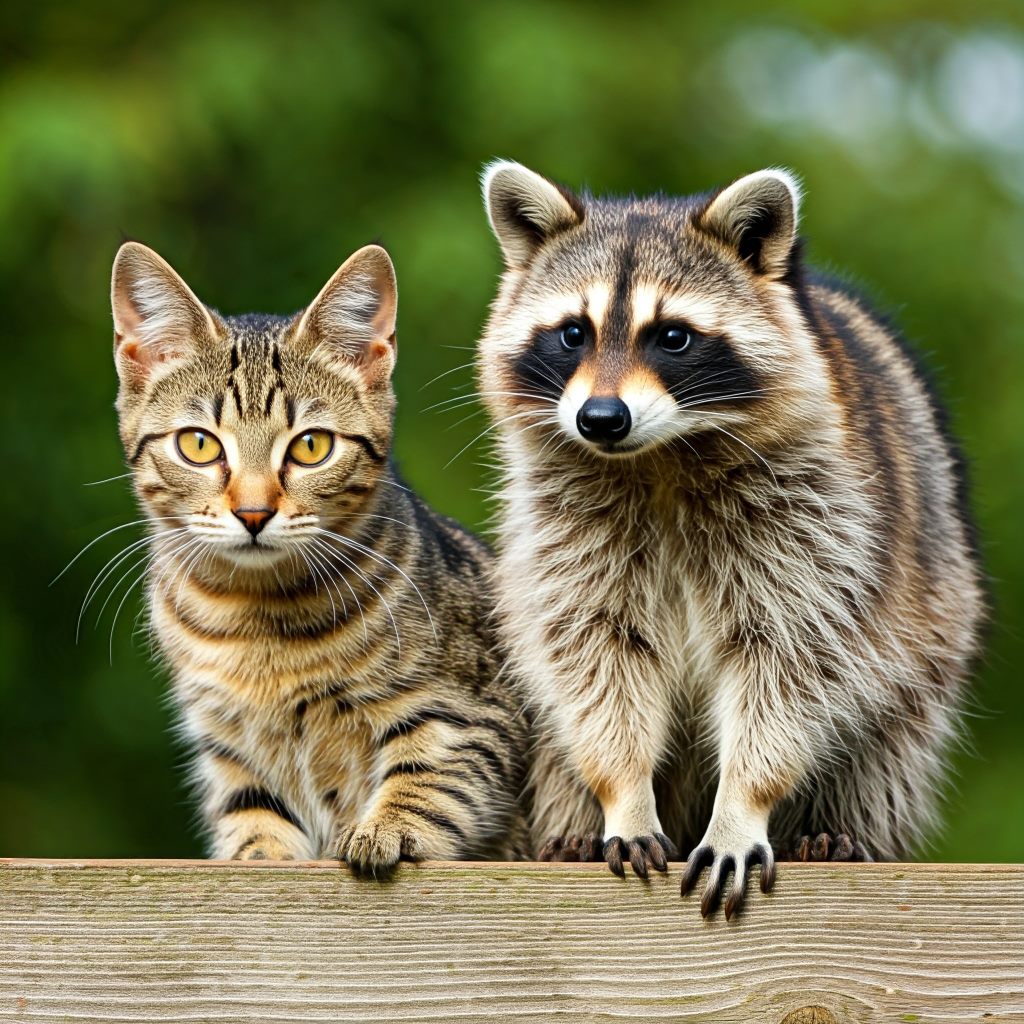
Raccoons are one of the most common animals in the United States. They can be found in every state, and they are even native to some. Raccoons may look cute and cuddly, but they can be vicious predators who will attack if they feel threatened.
The answer is yes! Some people believe that cats and raccoons can’t live together because they share similar traits: both species are omnivores, which means they eat both plants and animals. So while they might like each other’s company, they may not get along very well as neighbors.
However, this isn’t true at all! In fact, there are many different types of raccoons that aren’t known for aggression at all! The best way to tell if your cat will get along with a raccoon is by looking at their personalities: if you have a friendly raccoon who likes attention from humans (or vice versa), then you might have just found another pet for your family!
Raccoons and cats can be friends. It is possible for both species to live in harmony, but only if they are given the proper environment and care. Raccoons may seem like they have nothing in common with cats, but they do share some traits. For example, both species are mammals that have retractable claws and tails. They also are omnivores and have a keen sense of smell.
Cats have a natural aversion to rodents, so raccoons could be considered an exception to this rule. Raccoons are actually the only known mammal that has been known to live with cats (not including domesticated pets).
Do Raccoons Attack Cats?
Raccoons are nocturnal animals and will be more active at night. If your cat has been attacked by a raccoon, it’s possible that the animal may have been startled or frightened by something. Raccoons are known to be aggressive towards cats, and they may have mistaken your cat for prey. If you live in an urban area where there are many raccoons, they may be more likely to attack cats than if you lived in a rural area with fewer raccoons.
Raccoons are omnivores, meaning that they eat both plants and animals, including birds and small rodents. They also consume garbage and carrion. They don’t usually kill their prey outright because they prefer to eat it alive — so if you see a raccoon feeding on your cat’s body or hear it whispering gently to itself while it eats its meal, it’s probably not trying to kill your pet!
Raccoons are opportunistic feeders and will eat almost anything they can find. They will also eat pet food left out by owners in an effort to get some extra food or even if it is simply too tempting to resist.
Raccoons also like to eat birds, which can be an issue if you have a bird feeder in your yard. Raccoons will enter your home through windows and doors to get at the bird feeder and steal the seeds from the tray.
If you think that a raccoon attacked your pet, contact animal control as soon as possible — they’ll be able to tell if a raccoon is responsible for the attack and take steps to prevent future attacks from occurring in the area.
Can a Racoon Be Friends With a Cat?
Yes. Raccoons and cats can be friends. The thing is, they have to be trained together from a young age. They need to be taught that they are not pests, but valuable members of the family who will be fed and given attention when needed.
There are many benefits to having a raccoon as a pet. Their intelligence level is comparable to that of dogs and cats, and they make excellent companions for people who love animals.
If you have a raccoon friend who is old enough to reason, you should start by teaching them about the difference between good and bad smells. Show them how people give each other affection by rubbing noses or hugging and kissing, then let them touch your fingers or play with your hair or clothing. If they’re curious about what’s under your clothes, show them by taking off your shirt or jacket.
Encourage them to take part in family activities like watching television together, making meals together and playing games together. You can also do things like feeding them small pieces of bread crusts that they can tear off with their teeth if they want more food during meals or if they think it’s funny (and most do).
The two creatures need to learn how to coexist peacefully and respect each other’s space. If you want a racoon as a pet, it should be introduced slowly into the home with supervision so that there are no accidents or fights between them as they get used to each other’s presence in the same space for the first time ever!
Do Cats Fight With Raccoons?
Cat and raccoon can be friendly, but they do fight.
A cat and a raccoon can live together in harmony. They have the same food, water and habitat preferences, so they don’t compete for resources. However, they may fight over territory or food sources that are not shared by both species.
Cats are territorial animals who defend their turf against other cats and dogs. Raccoons are also territorial and will fight with other raccoons to defend their own territory or food sources. This can lead to injury for both animals if not handled properly.
Raccoons are nocturnal animals, so they usually don’t come out during the day. That means that if your cat is getting into his food at night, he’ll probably be okay. And while raccoons can be a nuisance to humans who live near them, they’re not usually dangerous or aggressive toward pets or people.
Cats and raccoons are most likely to fight when both animals are fed up with each other. They may even growl at each other before attacking if they have been in the same territory for too long without finding a way out of it. If fighting becomes too much for either animal and they need some time apart from each other, then owners might try putting one animal in another room until things calm down again.
Are Raccoons Closer to Dogs or Cats?
Raccoons are closer to dogs than they are cats.
Raccoons are not domesticated animals like cats and dogs, but that doesn’t mean they aren’t close relatives. Both cats and raccoons have tails, for one thing, and both have a similar appearance in their fur.
The most prominent difference between raccoons and cats is their size. Raccoons can grow up to be as long as six feet long while a domestic cat only grows to about half that length.
In addition to their size differences, there’s another key difference between raccoons and cats: Their diet. While most domestic cats eat meat exclusively, many raccoons eat insects as well as small mammals like mice, rats and rabbits. Domestic cats also hunt birds and small reptiles such as snakes and lizards.
Raccoons have some of the same traits as cats, but their personalities are quite different. A wild raccoon will never be as friendly as a domesticated cat or dog. They do not have the same desire for human companionship as house pets do, and they may even look at humans with distrust and suspicion because of their natural wild nature.

